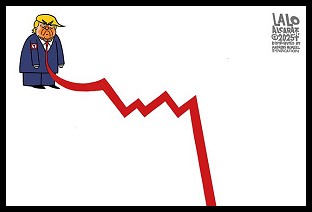 A cluster of new, eye-opening studies released late last week bring into sharp focus the fact that society's current path threatens to bring us into a head-on collision with planetary boundaries, leading to unnecessarily unpleasant results.
A cluster of new, eye-opening studies released late last week bring into sharp focus the fact that society's current path threatens to bring us into a head-on collision with planetary boundaries, leading to unnecessarily unpleasant results.
First came the disturbing joint announcement from NASA and NOAA that 2014 has smashed the record for hottest year in the instrument record. The results mean 14 of the hottest 15 years on record have all occurred since the turn of the century.
That's quite a trend. One could hold out hope that this undeniable --- and undesirable --- trend of rising global temperatures would bring an end to the ludicrous propaganda of the climate change denial industry and their claims of a "global warming pause," "hiatus" and "global cooling" --- all in service of perpetuating the supremacy and profits of the fossil fuel industry. But that hope, as we detailed on Friday, is most likely in vain.
Turns out the laws of physics aren't actually negotiable. Humanity's frenzy to dig up and burn carbon, safely stored underground through natural processes over millions of years, has undoubtedly brought societal progress for many, but it has also brought consequences. And those consequences are cumulative.
If you keep doing the things that raise global temperatures, you shouldn't be surprised when temperatures keep going up. Sec. of State John Kerry summed it up succinctly: "What’s surprising is that anyone is surprised that 2014 was the hottest year on record. The science has been screaming at us for a long, long time."
Except humanity is doing a lot more than just cooking the planet by raising the temperature. Consider this less-than-cheerful news from the UK's Guardian [emphasis added]...
Humans are "eating away at our own life support systems" at a rate unseen in the past 10,000 years by degrading land and freshwater systems, emitting greenhouse gases and releasing vast amounts of agricultural chemicals into the environment, new research has found.
Two major new studies by an international team of researchers have pinpointed the key factors that ensure a livable planet for humans, with stark results.
Of nine worldwide processes that underpin life on Earth, four have exceeded "safe" levels --- human-driven climate change, loss of biosphere integrity, land system change and the high level of phosphorus and nitrogen flowing into the oceans due to fertiliser use.
But there is some (qualified) good news: Humanity hasn't doomed life in the oceans! At least not yet.
According to a new analysis of the world's oceans published on Thursday in the journal Science, ocean species are on the brink of mass extinction, but they aren't there yet. So there's that.
The analysis is the first to incorporate multiple lines of study into a single, comprehensive accounting of the impact humans have had on the oceans, and it's a doozy: humans are poised to bring the same industrial extraction, pollution, mayhem and devastation to ocean species that we have brought to land species. But study co-author Malin L. Pinsky, a marine biologist at Rutgers University, sounds a hopeful note to the New York Times: "We're lucky in many ways. The impacts are accelerating, but they're not so bad we can't reverse them."
That's the problem with brinks --- you often don't realize you're at one until you've already gone over. It's a stupid way to manage risk. Luckily, scientists are sounding the alarm, measuring the moving targets of what we are doing to the dynamic systems that have sustained our species quite well, up to now.
Some lawmakers are beginning to step out in front of these challenges --- or, at least, trying to --- beginning the long slog of crafting policies that could give us a fighting chance to stave off the worst consequences of our actions.
Washington Gov. Jay Inslee, a Democrat, is working to launch an ambitious carbon cap & trade system for his state (his reasoning for choosing cap & trade over a simpler carbon tax is instructive).
California Gov. Jerry Brown is proving in real time that smart policies based in sound science are economic boosters --- expanding his state's ambitious renewable energy goals, and transforming transportation systems and water infrastructure to prepare for the challenges of climate change now and in coming decades. Despite its larger population, California achieved this economic turnaround with only 26% of the emissions of Texas, the next most populous state.
Across the U.S., the solar industry is adding jobs 10 times faster than the overall economy, even in states where anti-competitive monied interests are trying desperately to smother it. The economic boost of home-grown clean energy jobs --- jobs that cannot be outsourced, unless someone finds a way to ship roofs to China --- is just one example of the increasingly clear economic benefits of taking action.
As we reported in last Tuesday's Green News Report, Denmark is well on its way to becoming fossil fuel-free by 2050, generating 40 per cent of its electricity from wind energy alone over the past year --- another signpost of success from steady, sustained investment in renewable energy. "It's not easy to transform a complex society. It's not easy to find a way in the wilderness," Denmark's climate minister Rasmus Petersen remarked at a UN climate event in October. "Denmark, however, has been among the first countries to enter, and I think we have found a path. ... By leading the way we can now leave traces and tracks for others to follow."
The solution, as Kerry said in his remarks at the UN climate treaty talks in Lima, Peru in December [emphasis added] is clear:
Smart policies, smart limits, effective enforcement --- we have all the tools we need, and there are no technical or scientific barriers to solving these problems. Only political barriers still hold us back.
The United Nation's climate treaty negotiations coming up in December 2015 present just one opportunity to overcome political barriers in meeting these challenges. The US Presidential election in 2016 offers another. But there are thousands of state and local elections, city council meetings, and myriad other opportunities in between to make your voice heard. Demand action from elected leaders, candidates, governments, businesses, civic organizations, universities, etc. Transformational change requires steady, sustained focus and involvement. These are the days to fight for the future you want. How about now, before it's too late?
Desi Doyen is the co-host and managing editor of The BRAD BLOG's Green News Report, the producer of KPFK's The BradCast and an occasional guest host on The Young Turks. Follow her on Twitter at: @GreenNewsReport.


 Cliff Diving with Donald: 'BradCast' 4/7/25
Cliff Diving with Donald: 'BradCast' 4/7/25 Sunday 'Don't Look Down' Toons
Sunday 'Don't Look Down' Toons 'Mob Boss' Trump's Global Trade Sanctions Tank U.S., World Markets: 'BradCast' 4/3/25
'Mob Boss' Trump's Global Trade Sanctions Tank U.S., World Markets: 'BradCast' 4/3/25 'Green News Report' 4/3/25
'Green News Report' 4/3/25
 Dems Step Up: Crawford Landslide in WI; Booker Makes History in U.S. Senate: 'BradCast' 4/2/25
Dems Step Up: Crawford Landslide in WI; Booker Makes History in U.S. Senate: 'BradCast' 4/2/25 Judge Dismisses Long-Running Challenge to GA's Unverifiable, Insecure E-Vote System: 'BradCast' 4/1/25
Judge Dismisses Long-Running Challenge to GA's Unverifiable, Insecure E-Vote System: 'BradCast' 4/1/25 'Green News Report' 4/1/25
'Green News Report' 4/1/25 Bad Court and Election News for Trump is Good News for America: 'BradCast' 3/31
Bad Court and Election News for Trump is Good News for America: 'BradCast' 3/31 Sunday 'Great Start!' Toons
Sunday 'Great Start!' Toons 'Green News Report' 3/27/25
'Green News Report' 3/27/25 Vets Push Back at Plan to Slash Health Care, 80K V.A. Jobs: 'BradCast' 3/27/25
Vets Push Back at Plan to Slash Health Care, 80K V.A. Jobs: 'BradCast' 3/27/25 Signal Scandal Worsens for Trump, GOP; Big Dem Election Wins in PA: 'BradCast' 3/26
Signal Scandal Worsens for Trump, GOP; Big Dem Election Wins in PA: 'BradCast' 3/26 'Emptywheel': Trump NatSec Team Should 'Resign in Disgrace': 'BradCast' 3/25/25
'Emptywheel': Trump NatSec Team Should 'Resign in Disgrace': 'BradCast' 3/25/25 USPS 'Belongs to the People, Not the Billionaires': 'BradCast' 3/24/25
USPS 'Belongs to the People, Not the Billionaires': 'BradCast' 3/24/25 We're ALL Voice of America Now: 'BradCast' 3/20/25
We're ALL Voice of America Now: 'BradCast' 3/20/25 What Trump's 'Timber Production Expansion' Means (and Costs): 'BradCast' 3/19/25
What Trump's 'Timber Production Expansion' Means (and Costs): 'BradCast' 3/19/25 Courts Largely Holding Against Trump, Musk Lawlessness: 'BradCast' 3/18/25
Courts Largely Holding Against Trump, Musk Lawlessness: 'BradCast' 3/18/25 Chief VOA Reporter on Outlet Falling Silent First Time Since 1942: 'BradCast' 3/17/25
Chief VOA Reporter on Outlet Falling Silent First Time Since 1942: 'BradCast' 3/17/25
 VA GOP VOTER REG FRAUDSTER OFF HOOK
VA GOP VOTER REG FRAUDSTER OFF HOOK Criminal GOP Voter Registration Fraud Probe Expanding in VA
Criminal GOP Voter Registration Fraud Probe Expanding in VA DOJ PROBE SOUGHT AFTER VA ARREST
DOJ PROBE SOUGHT AFTER VA ARREST Arrest in VA: GOP Voter Reg Scandal Widens
Arrest in VA: GOP Voter Reg Scandal Widens ALL TOGETHER: ROVE, SPROUL, KOCHS, RNC
ALL TOGETHER: ROVE, SPROUL, KOCHS, RNC LATimes: RNC's 'Fired' Sproul Working for Repubs in 'as Many as 30 States'
LATimes: RNC's 'Fired' Sproul Working for Repubs in 'as Many as 30 States' 'Fired' Sproul Group 'Cloned', Still Working for Republicans in At Least 10 States
'Fired' Sproul Group 'Cloned', Still Working for Republicans in At Least 10 States FINALLY: FOX ON GOP REG FRAUD SCANDAL
FINALLY: FOX ON GOP REG FRAUD SCANDAL COLORADO FOLLOWS FLORIDA WITH GOP CRIMINAL INVESTIGATION
COLORADO FOLLOWS FLORIDA WITH GOP CRIMINAL INVESTIGATION CRIMINAL PROBE LAUNCHED INTO GOP VOTER REGISTRATION FRAUD SCANDAL IN FL
CRIMINAL PROBE LAUNCHED INTO GOP VOTER REGISTRATION FRAUD SCANDAL IN FL Brad Breaks PA Photo ID & GOP Registration Fraud Scandal News on Hartmann TV
Brad Breaks PA Photo ID & GOP Registration Fraud Scandal News on Hartmann TV  CAUGHT ON TAPE: COORDINATED NATIONWIDE GOP VOTER REG SCAM
CAUGHT ON TAPE: COORDINATED NATIONWIDE GOP VOTER REG SCAM CRIMINAL ELECTION FRAUD COMPLAINT FILED AGAINST GOP 'FRAUD' FIRM
CRIMINAL ELECTION FRAUD COMPLAINT FILED AGAINST GOP 'FRAUD' FIRM RICK SCOTT GETS ROLLED IN GOP REGISTRATION FRAUD SCANDAL
RICK SCOTT GETS ROLLED IN GOP REGISTRATION FRAUD SCANDAL VIDEO: Brad Breaks GOP Reg Fraud Scandal on Hartmann TV
VIDEO: Brad Breaks GOP Reg Fraud Scandal on Hartmann TV RNC FIRES NATIONAL VOTER REGISTRATION FIRM FOR FRAUD
RNC FIRES NATIONAL VOTER REGISTRATION FIRM FOR FRAUD EXCLUSIVE: Intvw w/ FL Official Who First Discovered GOP Reg Fraud
EXCLUSIVE: Intvw w/ FL Official Who First Discovered GOP Reg Fraud GOP REGISTRATION FRAUD FOUND IN FL
GOP REGISTRATION FRAUD FOUND IN FL


































